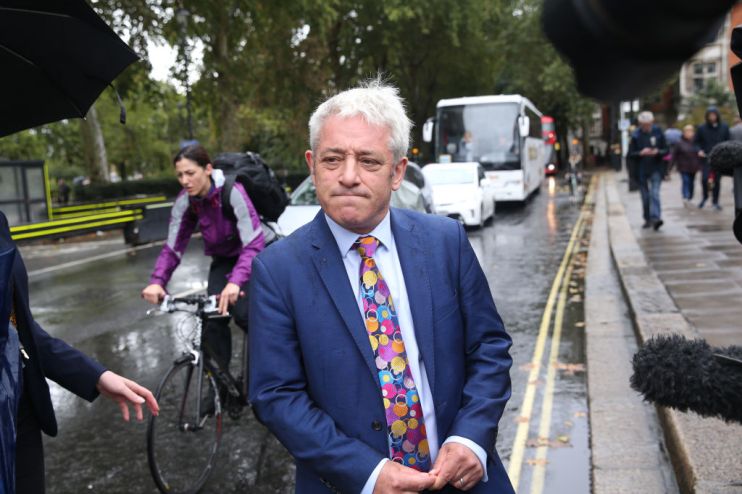Order, order: The race is on to replace John Bercow

The departure of John Bercow from the speakership of the House of Commons will create a vacancy of huge importance.
Yesterday, nine hopefuls vied with each other for the honour of replacing him, answering journalists’ questions on everything from the impartiality of the role, to Westminster’s alleged drug problem, to the rules on breast-feeding in the chamber. Even the merits of the speaker’s traditional dress (including a wig and knee breeches) were up for discussion.
The candidates know, no doubt, that whoever the Commons selects will have vital powers at a crucial point in our political history. It is perhaps the most significant speaker’s election in centuries.
It is easy to overlook the role of the speaker, but his or her influence over the Commons is vast. The speaker controls who speaks in debates, what amendments can be tabled, and has the casting vote in ties. Each of these is a hugely influential power, and whoever inherits them now will be far less fettered than previous speakers, thanks in part to the behaviour of the outgoing office-holder.
There is little formal oversight of the speaker, but normally pressure from inside the Commons acts as a check. Indeed, Bercow’s own opportunity came when Michael Martin resigned in 2009 rather than face being the first speaker since 1695 to lose a vote of no confidence.
Yet with no clear majority for anyone in the Commons, the chance of censuring the new speaker for anything short of flagrant transgressions will be slight. They will preside free of the usual pressures.
On top of their formal role, the speaker sits as sole judge of parliamentary procedure.
Though they reflect precedent, they are not bound by it and are free to create it. Many of the “rules” of parliament have been inventions of the speaker, from Denison’s rule that their crucial deciding vote should be used to maintain the status quo, to the prohibition on bringing the same vote multiple times. A radical speaker can rewrite the rule book as opportunity arises.
In following Bercow, the new speaker will also have some control over how the role itself is seen.
There is no denying that Bercow has been an activist speaker, arguably to the point of being partisan. Certainly, his rulings on Brexit results have shown a cavalier (or perhaps more strictly, Roundhead) approach to convention, repeatedly ruling in favour of Remainers when it came to procedural margin calls.
Should the next speaker recoil from this, it would mark Bercow as an aberration. Should they embrace it, the partisanship of the speaker would be hard to row back from.
The new speaker will have to decide on how to confront the ugliest parts of Bercow’s legacy: the failure to deal with bullying and sexual harassment within the parliamentary estate. This will appeal more to some of the candidates than making their name over contentious political issues.
As for the election itself, the parties in the Commons will face a difficult choice in deciding if they want a friend or a foe in the chair.
The speaker resigns from their party on appointment, and can, as has already been noted, only vote in tie-breaks. This means that it is effectively one seat off your majority – fine in times when elections were won by big margins, but a problem in an age of coalitions and pacts.
Parties will have to calculate carefully whether losing a seat is worth it to take over the chair. That the position alternates between the two main parties is a newish innovation, broken more often than it is honoured. Do not expect it hold this time round.
As we move through and beyond Brexit, there are likely to be more closely-fought votes, battles over amendments, and difficult calls over parliamentary procedure.
The new speaker will not only have to make these decisions, but also set the tone for how they are made – deciding whether the role is further politicised or is returned to the esteemed neutrality it once had.
While Bercow has seen it differently, it is worth remembering that the speakership used to be a noble sacrifice, putting aside any ministerial ambitions for a role that was high on responsibility and low on glory.
It was once the case that speakers had to be dragged to the chair, so poisoned was the chalice of mediating between the Commons and the Crown. In 1449, an Agincourt veteran knighted on the field of battle refused to become speaker, not wanting to deal with the aftermath of England’s retreat from Normandy.
As recently as 1971, a speaker could be nominated against their own wishes from the floor of the House.
There is evidently no shortage of volunteers this time around, so parliament must think carefully about who they choose, and what that choice will do to the role.
Main image credit: Getty
